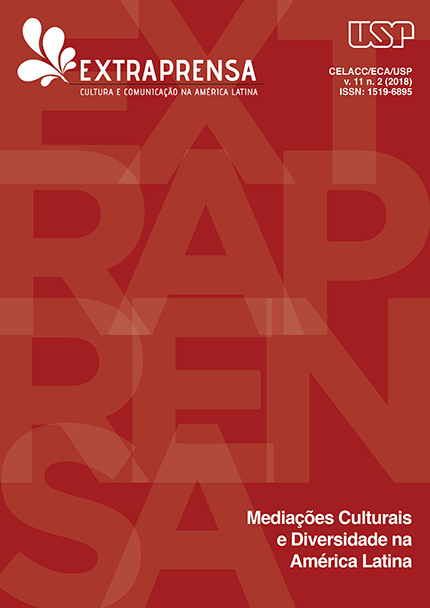The Commission on Truth in the Press: transitional justice, memory and recognition journalism
DOI:
https://doi.org/10.11606/extraprensa2018.147961Keywords:
Transitional Justice, Truth Commission, Press, Memory, RecognitionAbstract
In this article we analyse press stories on Brazil’s National Truth Commission (CNV) through a quantitative and qualitative study of the newspapers Folha de São Paulo and O Estado de São Paulo between January 01, 2010 and December 31, 2015. The methodology combines the concepts of collective memory, recognition and communicative reason, with ethical principles of journalism, allowing a ciritcal analysis of the CNV in these newspapers. The results indicate that even though newspapers have the potential to contribute to the formation of a collective memory on the dictatorship and the transitional period, promoting what we can call “recognition journalism”, the stories were predominantly factual and reactive to state actions, with poor contextualization and producing more well-know facts, aside from hegemonic memories and dichotomic subjectivities.
Downloads
References
ARENDT, H. Eichmann em Jerusalem. São Paulo: Companhia das Letras. 1999.
ABRÃO, Paulo. A Lei de Anistia no Brasil: As alternativas para a verdade e a justiça. Revista Acervo, Rio de Janeiro, v. 1, n. 24, p.119-138, maio 2011.
BRASIL. Comissão Nacional da Verdade. Relatório / Comissão Nacional da Verdade. – Brasília: CNV, 2014. 976 p. – (Relatório da Comissão Nacional da Verdade)
BLOTTA, V. O Direito da Comunicação: uma nova teoria crítica do direito a partir da esfera pública política. São Paulo: Fiuza, 2013.
BLOTTA, V. “You will never understand”: the monopoly of the place of speech through cultural trauma narratives in Brazil and Croatia. 2016 (manuscrito)
CARUTH, C. Unclaimed Experience: trauma, narrative and history. London: John Hopkins. 1996
BUCCI, E. A Imprensa e o Dever da Liberdade. São Paulo: Contexto, 2009.
CHARAUDEAU, P. Discurso das mídias. São Paulo: Contexto, 2006.
FERRAZ JÚNIOR, T. S. Free-Software and Non-Exclusive Individual Rights. Archiv für Rechts- und Sozialphilosophie, vol 94, 2008, Heft 2.
GRBESA, M. Privatisation of Politics in Croatia: Analysis of the 2003 and 2007 Parliamentary Elections. Medji.istraz. 2010, p. 57-78.
MAIA, R. C.M. Reconhecendo o direito à memória e à verdade: Apontamentos sobre o papel das histórias de vida no trabalho da Comissão Nacional da Verdade. IX Encontro da ABCP: Comunicação Política e Opinião Pública. Brasília, 4-7 agosto, 2014.
HABERMAS, J. Ay, Europa! Pequeños escritos políticos. Madrid: Trotta, 2009.
HALBWACHS, M. A Memória Coletiva. 1990. São Paulo: Revista dos Tribunais. 133 p.
HAYNER, P. B. Past Truths, Present Dangers: The Role of Official Truth Seeking in Conflict Resolution and Prevention. In: STERN, P. C.;
DRUCKMAN, D. (Orgs). International conflict resolution after the cold war, Washington: Natioal Research Council, 2000, p. 238- 282
HONNETH, A. Luta por reconhecimento: A gramática moral dos conflitos sociais. 1. ed. São Paulo: Editora 34, 2003. 291 p.
HONNETH, A. Freedom’s Right. New Directions in Critical Theory. New York: Columbia, 2014.
THE INSTITUTE ON WAR AND PEACE REPORTING. Guidelines on Peace Reporting. August 14, 2008. Disponível em: https://ijnet.org/en/blog/guidelines-peace-reporting (último acesso 10 de agosto de 2016)
KISHI, S. A. S. Direito à informação e à participação na Justiça de Transição. In: SOARES, I. V. P.; KISHI, S. A. S. (Coord.). Memória e Verdade: a justiça de transição no Estado Democrático brasileiro. Belo Horizonte: Fórum, 2009, cap. 14, p.273-291
LAPLANTE, L. J; PHENICIE, K. Mediating post-conflict dialogue: the media’s role in transitional justice process. Marquette Law Review, Michigan, a.1, v 93., p.251-283, 2009
PRICE, M. E.; STREMLAU, N. Media and transitional justice: Toward a systematic approach. International Journal of Communication, v.6, p.1077–1099, dez. 2012.
POLLAK, M. Memória, esquecimento, silêncio. Estudo Históricos. Rio de Janeiro, v. 3, n. 2, p.3-15, 1989.
RICOEUR, P. A Memória, a história, o esquecimento. Campinas: Editora da Unicamp, 2007, 535 p.
TELES, E. Democracia e Estado de Exceção: transição e memória política no Brasil e na África do Sul. São Paulo: Fap-Unifesp. 2015.
SAMPAIO, J. A. L; LEMOS, E. L. Notas sobre o direito à memória e à verdade. In: PIOVESAN, F.; SOARES, I. V. P. (Org.). Direitos humanos atual. Rio de Janeiro: Elsevior, 2014. p. 202-219.
SAVELSBERG, J., KING, R. D. Law and Collective Memory. Annual Review of Law and Social Science. Vol. 3, Dec. 2007, pp. 99-114.
Downloads
Published
Issue
Section
License
Ao submeter qualquer material científico para Extraprensa, o autor, doravante criador, aceita licenciar seu trabalho dentro das atribuições do Creative Commons, na qual seu trabalho pode ser acessado e citado por outro autor em um eventual trabalho, porém obriga a manutenção de todos os autores que compõem a obra integral, inclusive aqueles que serviram de base para o primeiro.
Toda obra aqui publicada encontra-se titulada sob as seguintes categorias da Licença Creative Commons (by/nc/nd):
- Atribuição (de todos os autores que compõem a obra);
- Uso não comercial em quaisquer hipóteses;
- Proibição de obras derivadas (o trabalho não poderá ser reescrito por terceiros. Apenas textos originais são considerados);
- Distribuição, exibição e cópia ilimitada por qualquer meio, desde que nenhum custo financeiro seja repassado.
Em nenhuma ocasião a licença de Extraprensa poderá ser revertida para outro padrão, exceto uma nova atualização do sistema Creative Commons (a partir da versão 3.0). Em caso de não concordar com esta política de Direito Autoral, o autor não poderá publicar neste espaço o seu trabalho, sob pena de o mesmo ser removido do conteúdo de Extraprensa.







